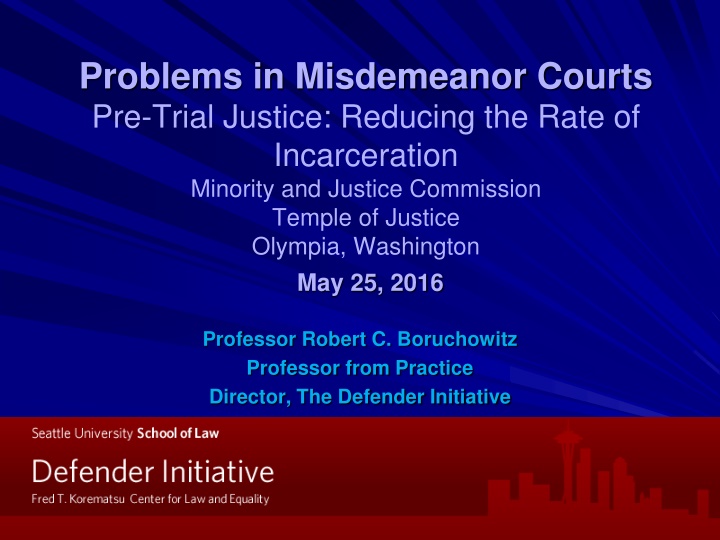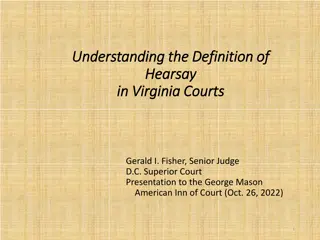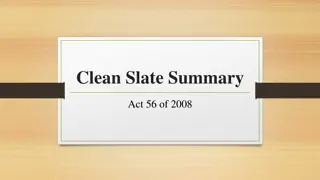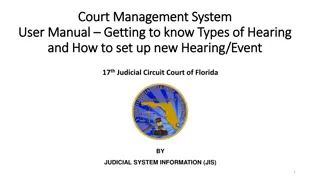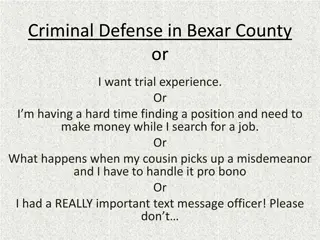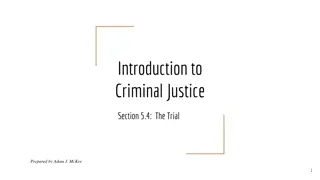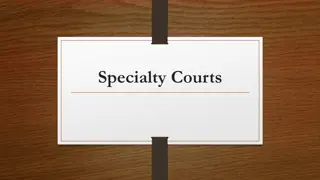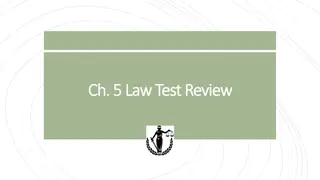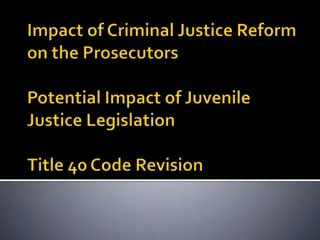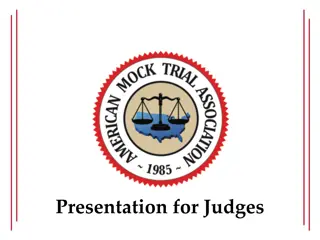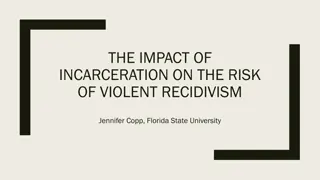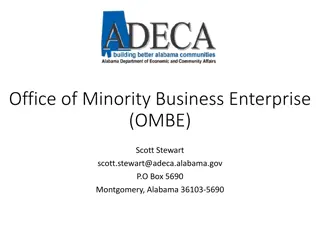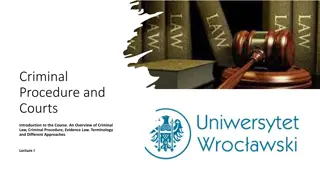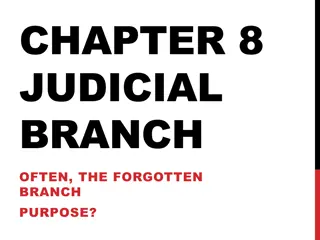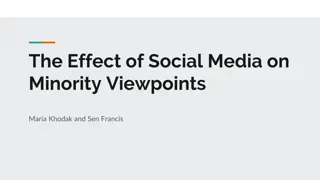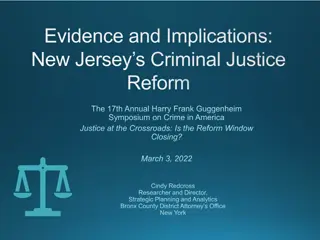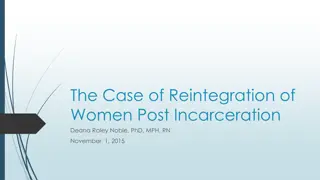Challenges in Pre-Trial Misdemeanor Courts: Addressing Minority Incarceration Rates
Amidst clear legal guidelines, some misdemeanor courts in Washington continue to witness individuals appearing without legal representation, leading to unjust incarcerations and life-altering convictions. The disproportionate impact on minorities, the heavy burden on resources, and the erosion of justice perception are significant concerns. The importance of legal counsel in misdemeanor cases, highlighted by landmark court cases, stresses the need for fair treatment and proper representation in court for all individuals.
Download Presentation

Please find below an Image/Link to download the presentation.
The content on the website is provided AS IS for your information and personal use only. It may not be sold, licensed, or shared on other websites without obtaining consent from the author.If you encounter any issues during the download, it is possible that the publisher has removed the file from their server.
You are allowed to download the files provided on this website for personal or commercial use, subject to the condition that they are used lawfully. All files are the property of their respective owners.
The content on the website is provided AS IS for your information and personal use only. It may not be sold, licensed, or shared on other websites without obtaining consent from the author.
E N D
Presentation Transcript
Problems in Misdemeanor Courts Pre-Trial Justice: Reducing the Rate of Incarceration Minority and Justice Commission Temple of Justice Olympia, Washington May 25, 2016 Professor Robert C. Boruchowitz Professor from Practice Director, The Defender Initiative
Despite clear case law and court rules, there are some courts in Washington where people appear without counsel in misdemeanor cases, sometimes getting put in jail and having convictions that can dramatically affect their lives.
Why Misdemeanors Matter Huge Commitment of Resources When All Governments Are Struggling To Make Ends Meet. Fairness Fundamental rights are being denied to thousands of people in the places that should protect them the most. Perception of Justice Most people who actually go to a court go to these courts. Their respect for American justice is shattered when they experience the problems discussed here. Racial Disparity People charged and convicted are disproportionately of color
Argersinger v. Hamlin, 407 U.S. 25, 34-35 (1972) Counsel is needed so that the accused may know precisely what he is doing, so that he is fully aware of the prospect of going to jail or prison, and so that he is treated fairly by the prosecution. In addition, the volume of misdemeanor cases, far greater in number than felony prosecutions, may create an obsession for speedy dispositions, regardless of the fairness of the result. The Report by the President's Commission on Law Enforcement and Administration of Justice, The Challenge of Crime in a Free Society 128 (1967), states: The calendar is long, speed often is substituted for care, and casually arranged out-of-court compromise too often is substituted for adjudication. Inadequate attention tends to be given to the individual defendant, whether in protecting his rights, sifting the facts at trial, deciding the social risk he presents, or determining how to deal with him after conviction.
The same can be said of some of Washington s misdemeanor courts today, 44 years later. In some, there are no lawyers at first appearance. In others, lawyers are in the room but do not represent the defendants. Sometimes, a defendant comes in to quash a warrant and is jailed without counsel to assist in the hearing.
1968: University of Washington Professor John M. Junker Wrote [A] large majority of the [people] annually charged with non-traffic misdemeanors must, if they are financially unable to hire an attorney, face the bewildering, stigmatizing and (especially at this level) assembly-line criminal justice system without the assistance of counsel.
By court rule there is a right to counsel at first appearance hearings in Washington. RULE CrR 3.1: RIGHT TO AND ASSIGNMENT OF LAWYER The right to a lawyer shall extend to all criminal proceedings for offenses punishable by loss of liberty .... (1) The right to a lawyer shall accrue as soon as feasible after the defendant has been arrested, appears before a committing magistrate, or is formally charged, whichever occurs earliest (2) A lawyer shall be provided at every critical stage of the proceedings.
By US Supreme Court decisions, there is a right to effective assistance in negotiating a plea, in the actual guilty plea, and at sentencing. Padilla, Lafler, Mempa v Rhay. The defendant needs to know counsel can assist at the plea stage. Iowa v Tovar.
By court rule, there is a right to a thorough inquiry before any waiver of counsel. CrR 4.1 arraignment If the defendant is not represented and is unable to obtain counsel due to indigence, counsel shall be assigned to the defendant by the court, unless the defendant makes a knowing, voluntary and intelligent waiver of counsel. (d) Waiver of Counsel. If the defendant chooses to proceed without counsel, the court shall determine on the record whether the waiver is made voluntarily, competently and with knowledge of the consequences. The court shall make a thorough inquiry of the defendant's understanding before accepting the waiver.
This rule is consistent with the US Supreme Court decision in Von Moltke v. Gilles in which the Court wrote that: -- a mere routine inquiry -- the asking of several standard questions followed by the signing of a standard written waiver of counsel -- may leave a judge entirely unaware of the facts essential to an informed decision that an accused has executed a valid waiver of his right to counsel.
Von Moltke v. Gillies 332 U.S. 708 (1948) It is the solemn duty of a federal judge before whom a defendant appears without counsel to make a thorough inquiry, and to take all steps necessary to insure the fullest protection of this constitutional right at every stage of the proceedings.
By US Supreme Court decision, there is a right to a knowing, voluntary, and intelligent waiver of counsel and a knowing, voluntary, and intelligent plea of guilty. Boykin v. Alabama.
Washingtons Supreme Court has required that the record of the plea hearing must affirmatively disclose a guilty plea was made intelligently and voluntarily, with an understanding of the full consequences of such a plea. Wood v. Morris, 87 Wn.2d 501, 503, 554 P.2d 1032, 1033 (1976)
Misdemeanors can have a devastating impact on defendants.
Economic Penalties Increasing fines, costs, and other fees have become staggering. Cumulative impact of all of the economic obligations a significant problem for most defendants. Courts have demonstrated an almost total disregard for the ability of the defendants to afford the amounts assessed. Criminal convictions diminish employment prospects and eligibility for housing and other benefits. McCormack, Economic Incarceration , Windsor Yearbook of Access to Justice, 2007.
Other Consequences The consequences that can result from any conviction, including a misdemeanor conviction, have expanded significantly. These consequences can be quite grave. The defendant can be deported, denied employment, or denied access to a wide array of professional licenses. A person convicted of a misdemeanor may be ineligible for student loans and even expelled from school. Additional consequences can include the loss of public housing and access to food assistance, which can be dire, not only for the misdemeanant but also for his or her family. Fines, costs and other fees associated with convictions can also be staggering and too frequently are applied without regard for the ability of the defendants to pay the assessed amounts. No criminal conviction should be regarded as minor or unimportant. Minor Crimes, Massive Waste.
Other considerations There also is a cost impact as cases that might be dismissed with counsel continue and result in jail and probation. [20 % dismissal rate in Seattle] Racial disproportionality
Yet every day in some courts in this state people are pleading guilty without any meaningful consultation with counsel and with no representation, and in addition to convictions that will affect them for the rest of their lives, sometimes they are going to jail.
Sometimes there is a contract public defender in the courtroom who may even provide some preliminary advice to the defendant. But despite the court rule requiring a waiver of counsel, there are courts that in effect require the defendant to insist on exercising the right to counsel, and that are willing to send people to jail without waivers that would meet the requirements of the court rule.
And there are prosecutors who are willing to negotiate guilty pleas with defendants who do not have a lawyer and who have not even appeared in front of a judge to take these artificial waivers of counsel. That is despite RPC 3.8 that requires that prosecutors (b) make reasonable efforts to assure that the accused has been advised of the right to, and the procedure for obtaining, counsel and has been given reasonable opportunity to obtain counsel; (c) not seek to obtain from an unrepresented accused a waiver of important pretrial rights, such as the right to a preliminary hearing;
Having counsel is not just a formality When effective counsel are provided, the dismissal rate can be as high as 20 %. When there are no lawyers and everyone pleads guilty, one can infer that 20% of those cases, some of which result in jail and lengthy and costly probation, should have been dismissed.
Research shows that effective advocacy and offering credible information to the court has resulted in increasing the pretrial release on recognizance as much as 2 and a half times more for defendants with counsel than those without a lawyer.
Racial Disparity The crisis in America s public defense system has a much more acute impact on communities of color. The dramatic under-funding and lack of oversight of America s indigent defense services, described at length above, has placed people of color in a second class status in the American criminal justice system. The Terrible Toll of America s Broken Misdemeanor Courts, p. 47
Why counsel is required at first appearances Accused persons generally cannot without help * understand the elements of the charge, possible defenses, or the full nature of the consequences of a conviction; *challenge a finding of probable cause; *advocate effectively for personal recognizance release or reduced bail; *advocate effectively for sentencing alternatives.
Whats wrong with not providing a lawyer? No opportunity for defendant to understand options or consequences of conviction or to test government s case Violates Padilla v. Kentucky: the negotiation of a plea bargain is a critical phase of litigation for purposes of the Sixth Amendment right to effective assistance of counsel. Jargon and abbreviations likely not understandable by layperson defendants
Accused persons generally cannot without help make a valid decision about waiving counsel or waiving trial. The fairness of the proceedings and the integrity of the court are at risk.
The Judges Recognize The reality we see every day is that people entering our criminal justice system are confused by or ignorant of legal concepts, often unsophisticated, low on the literacy continuum, frightened, intimidated by authority, and faced by increasingly complicated direct and collateral consequences of conviction.
The courts that take guilty pleas from unrepresented people who have not properly waived counsel are a vestige of the pre-Argersinger days when misdemeanors were not considered serious, when so called police courts with non lawyer judges ignored the constitution as normal practice. It is long past time to end these practices and to insist that the constitutional right to counsel is honored in all of our courts all of the time.
Recommendation 1: Jurisdictions should appoint counsel in a timely manner prior to initial bail and release hearings.
Recommendation 2: The first appearance ...should provide the opportunity for defense counsel, pretrial release services representatives and family members to present information supporting the least onerous pretrial release conditions appropriate.
Recommendation An assigned defense lawyer should be appointed at the earliest possible time to ensure that he or she has the opportunity to interview the defendant prior to the first appearance hearing and to provide adequate opportunity to prepare an argument. Preparation includes access to a telephone to call family members, friends and other individuals who can verify information needed to establish a defendant's community ties, and access to a defendant's prior criminal history and appearance in court.
What Counsel Should Be Doing at These Hearings Challenge probable cause Talk with client about rights, silence, ability to post bail, residence, work, references, time in community; assess any immediate needs of client Advocate for release Confirm appointment process beyond first appearance Consider appellate review and pursue as appropriate Begin investigation and research
What Judges Can Do Provide thorough advice to defendants on what counsel can do for them and the disadvantages of going pro se Do thorough inquiries on waivers of right to counsel and right to trial Make sure that people who plead guilty understand the elements of the charge and the consequences of a guilty verdict. Use the WSBA CPD form. Provide counsel to eligible people.
Washington State Bar Council on Public Defense Form
Yelm, WA Municipal Court Judge s observation after providing counsel [i]t does seem that more cases are reduced/dismissed at 1st appearance, and that is, I believe, due to the presence of both the prosecutor and public defender. Since going all public defender, I have noticed two things: 1) many more defendants are represented by counsel, and 2) As a result, things move more smoothly at both the arraignment and pre-trial stages....The presence of the public defender improves communication between the sides greatly.
Pasco, WA City Attorney Comments Those accused are expressing more confidence in the system and the overall experience is less intimidating. The Court, Defenders, and Prosecutors have all expressed that the system seems to be working much better with more equitable results. It is going smoothly and there is a reduction in jail time
Spokane Municipal Defender Observations We can identify immediately mentally ill defendants and either make a referral to mental health court or initiate a sanity commission process with a declaration by the first appearance attorney. We help the court in giving another side to the prosecutor s bail request, thus increasing the number of defendants OR d over the prosecutor s objection or given reduced bond amounts. On warrant cases, we often give information to the defendant as to when he missed court so that he can better articulate why he missed court, increasing his chances for OR. We can quickly discuss medical needs with the inmate and the need for OR for upcoming surgeries or procedures, or identify high-risk pregnancies to support OR. We quickly gather information on ties to the community, so we can get people back to school or back to work without a lengthy interruption.
Spokane City Defender We identify cases that can be easily resolved and set them for early hearings for dispositions. We challenge probable cause, and when we win, the defendants are released. Defenders can begin investigation immediately as appropriate, particularly on DV cases and excessive force issues. We coordinate the client s court dates to reduce the chance of another warrant in case they bond out. We can more easily determine that a defendant needs an interpreter, and we move that defendant s case to the afternoon of the same day with an in-court appearance with some time for the court to arrange for an interpreter, even if only by the language line over the phone. Kathy Knox
Conclusion It is a disgrace that fifty years after Gideon and forty-one years after Argersinger thousands of accused persons face the power of the state alone. It is not fair, and it is economically foolish and wasteful. The impact on people s lives is dramatic. This problem affects every American.
